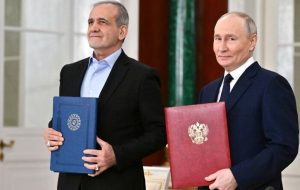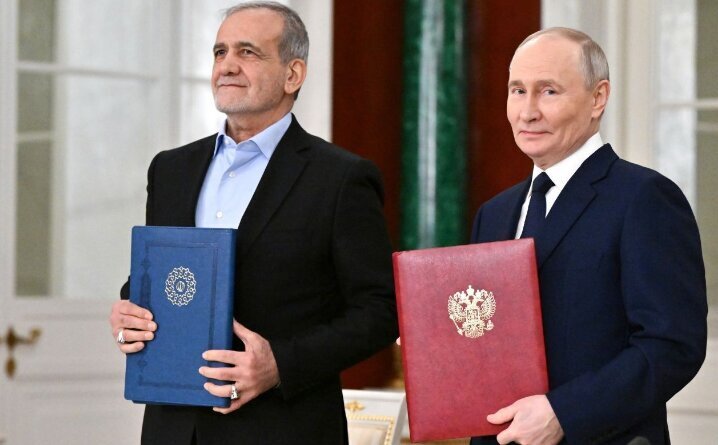10 questions and answers about Iran-Russia strategic partnership treaty
TEHRAN – Tehran and Moscow deepened their strategic alliance on Friday with the inking of the Treaty on the Comprehensive Strategic Partnership between the Islamic Republic of Iran and the Russian Federation in an official signing ceremony attended by President Masoud Pezeshkian and President Vladimir Putin. The treaty builds upon the first strategic cooperation pact


TEHRAN – Tehran and Moscow deepened their strategic alliance on Friday with the inking of the Treaty on the Comprehensive Strategic Partnership between the Islamic Republic of Iran and the Russian Federation in an official signing ceremony attended by President Masoud Pezeshkian and President Vladimir Putin.
The treaty builds upon the first strategic cooperation pact signed between the two countries in 2001. Efforts to devise a new agreement began in 2019 and ended in July 2024.
The newly forged strategic cooperation treaty between Iran and Russia comprises a preamble and 47 articles and covers a broad spectrum of collaboration, including military, economic, nuclear, and media spheres.
Here are 10 things to know about the agreement:
1. What does the treaty say about military cooperation and mutual support in case of military aggression?
According to Clauses 3 and 4 of Article 3:
If one party to the treaty is subjected to aggression, the other party will not provide military or any other assistance to the aggressor that could prolong the aggression. They will also work to ensure that disputes are resolved in line with the United Nations Charter and other applicable international laws.
The parties will not allow their territories to be used for supporting separatist movements or actions that threaten the stability and territorial integrity of the other party, nor for any hostile activities against each other.
Additionally, under Clause 4 of Article 5, the parties will consult and cooperate to address shared military and regional security threats.
2. What does the treaty say about intelligence and security cooperation between Iran and Russia?
Under Article 4:
To enhance national security and counter shared threats, the intelligence and security agencies of both parties will exchange information and expertise and strengthen their collaboration.
These agencies will work together within the framework of separate agreements.
3. What impact will the treaty have on security issues in the Caspian Sea?
Iran and Russia regard the involvement of third countries, particularly Western ones, in the Caspian region as a threat to their national interests. Clause 1 of Article 13 highlights:
The parties will collaborate to maintain the Caspian Sea as a region of peace, good neighborliness, and friendship, based on the principle of excluding military forces not belonging to the coastal states, ensuring security and stability in the area.
4. What does the treaty say about countering unilateral sanctions?
While the treaty does not explicitly mention U.S. unilateral sanctions, both nations face significant sanctions from Washington. Article 19 addresses this issue generally, stating in Clauses 3 and 4:
If third-party actions directly or indirectly affect one of the treaty parties, their individuals, entities, assets, or goods moving between the two parties, or intellectual property, services, or labor, the parties will refrain from joining or supporting unilateral coercive measures imposed by any third party.
If unilateral coercive measures are imposed by a third party on one treaty party, both will take practical steps to reduce risks and minimize the direct and indirect impacts on their mutual economic relations, individuals, entities, or assets. They will also limit the dissemination of information that could be exploited by the third party to intensify such measures.
5. What are the treaty’s plans to counter financial and banking sanctions imposed by the West on Tehran and Moscow?
According to Clause 2 of Article 20:
The parties will work together to establish a modern, independent payment infrastructure free from third-party interference, transition to bilateral payments in their national currencies, enhance direct interbank cooperation, and promote national financial products.
6. How does the treaty address Iran-Russia nuclear cooperation?
Article 23 states:
The parties will develop long-term and mutually beneficial relations to implement joint projects for the peaceful use of nuclear energy, including the construction of nuclear power facilities.
7. What does the treaty say about media cooperation between the two countries?
According to Article 33:
The parties will encourage their media outlets to engage in extensive cooperation to raise public awareness, support the free flow of information, and jointly counter false news and negative propaganda against the Islamic Republic of Iran and the Russian Federation. They will also combat the dissemination of fake information that threatens the national interests and security of either party, as well as other forms of media misuse.
8. How will potential disputes regarding the treaty’s implementation be resolved?
Under Article 44:
Any disputes arising from the interpretation or implementation of the treaty will be resolved through consultations and negotiations between the parties via diplomatic channels.
9. How long is the treaty valid?
According to Clause 1 of Article 45:
The treaty is subject to ratification and will come into effect 30 days after the last written notification that the required domestic procedures for its enforcement have been completed. It will remain valid for 20 years and will automatically renew for subsequent 5-year periods.
10. Can either party withdraw from the treaty?
Yes. According to Clause 2 of Article 45:
Either party can terminate the treaty by issuing a written notice at least one year before the end of its term.
